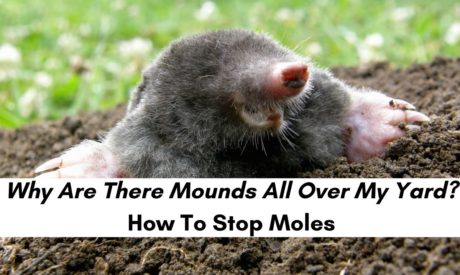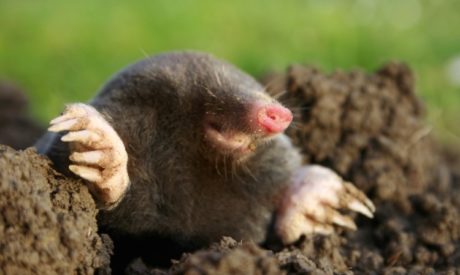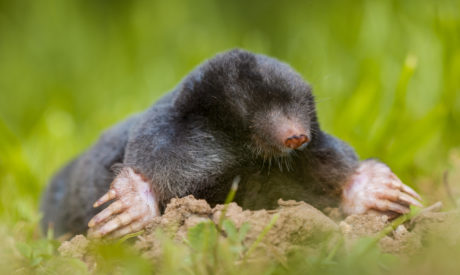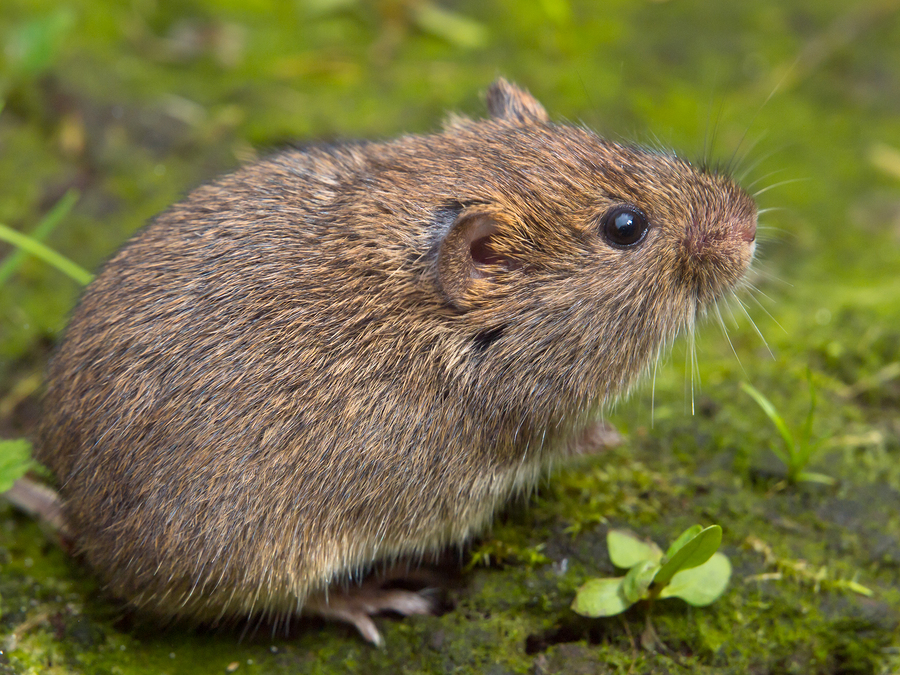Voles in the Triangle area of NC
Voles are small rodents that are similar in appearance to mice but with shorter tails. While they look more like mice than moles, the similar names and digging activity cause them to be confused with moles more often.
Moles are talpids, though, not rodents, and have velvety fur and large feet, as compared to voles’ more proportional feet and typical brown or gray rodent fur. Moles also have deep tunnels; whereas, only some voles create large tunnel networks, and those are much shallower and without the molehills of discarded dirt.
North Carolina actually has four different types of voles, and knowing the difference in appearance and behavior can quickly allow one to know which they are dealing with.
Rock and red-backed voles
Two varieties that we in the Raleigh-Durham area can quickly rule out are rock voles and red-backed voles. While both of these exist in North Carolina, they only exist in the mountainous far-west of the state.
They are also much more rare in general, especially the rock vole. In regions further north, like Canada and New England, they are more populous, but North Carolina’s warmer climate limits them to small numbers and only at higher altitudes. Rock voles, as the name suggests, prefer rocky soil, so their burrows between rocks do not cause as much annoyance even where they are present in larger numbers. And red-backed voles live in dense forests and generally use the burrows dug by other animals — including rock voles who frequently cohabitate with them.
Pine voles
Both of the remaining voles, however, are here in the Triangle and do cause damage for property owners. The more damaging of the two to suburban yards is the pine vole. Pine voles are small at around 3 inches long, but are stout and compact. Their tails are very short and they have brown or gray fur that cover their body, even partially concealing their eyes and ears.
Pine voles are by far the most prolific diggers of the four vole species in the state. They live the bulk of their lives underground and have extensive tunnel systems that they use to gain access to food, to sleep and to breed. You can see golf-ball sized holes dotting the areas where they live to give them access to their tunnels.
Pine voles are herbivores and attack the roots of plants by tunneling directly under them, just below the surface. Pine voles enjoy the roots of grasses, so they can quickly kill large parts of previously healthy lawns. Trees, shrubs and gardens are also victims of their root-eating behavior.
Meadow voles
The other destructive vole species that can be found in the Research Triangle is the meadow vole. These are bigger than pine voles, at more like 5 inches long. They also have slightly longer tails (that are still much shorter than a mouse’s), and their fur doesn’t cover their eyes and ears nearly as much.
Meadow voles live on the surface, making above-ground runways rather than underground tunnels. These voles live more in tall grass, which they eat and where they find protection from predators. Farmers will find meadow voles more of a problem often, because they are known to eat crops. They will also attack trees at the ground level, chewing rings around them, sometimes completely severing them from their root systems.
Lawns may be safer from meadow voles, but gardens, crops, ornamental grasses, shrubs and small trees are all at risk of their above-ground foraging.
Breeding habits of voles
Despite these differences, both meadow voles and pine voles are notorious for multiplying quickly. One female vole of either variety can have 10 litters of five offspring per year. After a couple months, these young are sexually mature and they can do the same. This is why, unlike with moles, a small population of voles can quickly overwhelm the landscape.
Voles do have natural predators, like hawks and foxes, that will arrive and prevent voles from breeding out of control, but these predators moving in can cause their own problems.
Controlling vole populations
Thankfully, you do not have to rely on hawks to control voles on your property. There are many proven methods of reducing and eliminating voles that accomplish this effectively.
One category of pest control — called exclusion — creates an environment that takes away the things that make the area attractive for voles. For meadow voles, this means not having tall grass that they will enjoy eating and making homes in. Frequent close mowing can accomplish this easily. You can also raise your garden beds with wood or plastic framing and wrap your trees to make it harder to get to above-ground plants you want to keep. Eliminating mulch around the trees can also help, since meadow voles use it to shield themselves from predators as they attack the tree.
For pine voles, raised beds can also help protect gardens, since they can’t dig to the roots, but small trees and lawn grasses will remain vulnerable to their underground tunnels. The only solution to this is to eliminate the safety of their tunnels. You can do this with traps, poisons and other proven methods. Zinc phosphide is an especially popular solution for dealing with pine voles in their tunnels.
You can also eliminate voles by reaching out to a local pest-control expert, like Critter Control of the Triangle. We have many years of experience in controlling pests like voles and proudly serve Raleigh, Durham, Chapel Hill, Cary, Wake Forest, Apex and other areas of the Research Triangle. Call us today at 919-382-0651 to learn more.
Whats the difference between moles and voles?
If you’re noticing damage in your yard or maybe some critters running around and you’re not sure what what to do, just visit this page where we explain how to identify moles vs. voles. Find out more about the differences between moles and voles.
Want more information on vole control?
Check out our Vole Control Flyer for quick facts: Vole Control Flyer
Take a moment to read more from Bell Laboratories’ Products: PCQ Pro – Bell Laboratories (belllabs.com)

Why You Have Moles In Your Yard And How To Get Rid of Them
- Posted by Lance
- On February 19, 2021
If you are a property owner in the Triangle area of North Carolina, there is a good chance that...

What’s The Difference Between Moles and Voles?
- Posted by Lance
- On March 10, 2020
Moles and voles are similar in many ways — they are small rodents, they dig around in your lawn,...

Moles vs. Voles
- Posted by Lance
- On December 14, 2017
Moles and voles both live here in the Triangle area of North Carolina. Both are rodents, both are pests,...




















